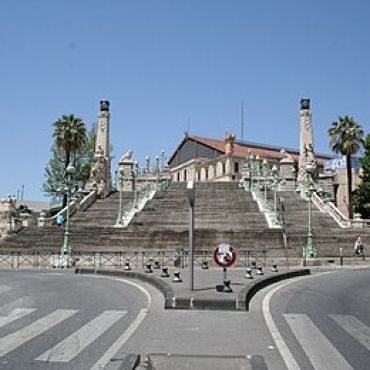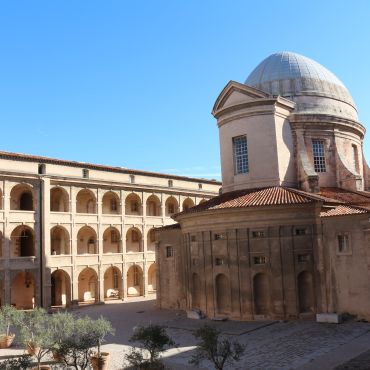Medical Matters in Post/colonial Situations (Matérialités médicales en situations post/coloniales)
Explore the striking importance of colonial components to long-term histories of health and medicine, from the early modern period to modern times
← Back to courses- CIVIS focus area
- Health
- Open to
-
- Master's
- Phd
- PhD candidates/students
- Field of studies
-
- Medicine and Health
- Social Science and humanities
- Type
-
- Blended Intensive Programmes (BIP)
- Course dates
- 3 February 2025 - 23 May 2025
The ambition of the training program is to convey the importance of colonial components to long-term histories of health and medicine. The BIP will invite students to confront their individual research on medical or biomedical topics in social sciences to discover, discuss and foster alternative colonial and post-colonial narratives concerning several European empires and post-colonial states from different disciplinary viewpoints. Among major issues, which the participants will be invited to reflect about, are the long history of health structures, landscapes and landmarks, the ethical, legal and historical issues concerning bodily material and medical documents on the long term, the political debates about medical citizenship at local, imperial and international level.
Main topics addressed
The program provides to the students knowledge related to the following fields:
- Colonial and Postcolonial History of Medicine
- Urban Space and (In)Visible Sites of Postcolonial Memory
- Political History of Science and of Museum Collections
Learning outcomes
The learning outcomes are threefold :
1. Training of younger scholars (MA students) in considering interdisciplinary and long-term questions into their research.
2. Get scholars (PhD students) working on colonial and post-colonial issues of health and medicine to create an international network of young scholars.
3. Inviting scholars to get involved into using alternative document to their post/colonial narratives, ranging from archive collections to museum artefacts, urban landscapes, sounds and videos, etc.
| Dates: 3 February 2025 - 23 May 2025 | Total workload: 100 hours |
| Format: Blended | ECTS: 4* |
| Location: Marseille, France | Language: French (C1),English (C1) |
| Contact: damiana.otoiu@fspub.unibuc.ro, christelle.rabier@ehess.fr |
*Recognition of ECTS depends on your home university.
Physical mobility
The physical mobility part will be running from 19 to 23 May 2025 and will take place in Marseille, France, at the Vieille Charité site of EHESS.
Schedule of the physical part
Part of the week will jointly be organized by the project partners: the Archives nationales d’Outre-Mer and the MuCEM (Musée des Civilisations de l'Europe et de la Méditerranée). On site, we will be having guided visits of museums and archives (MuCEM, Archives nationales d’Outre-Mer, etc.), plenary conferences by senior researchers, and working sessions, in addition to evening cultural events.
Virtual part
The virtual part will be running from 3 February 2025 to 18 April 2025.
Schedule of the virtual part
The online workshop aims to open up different perspectives on colonial legacies in different institutions. We wish to encourage discussion between participants from different universities, by providing time for exchange in plenary sessions and in small groups. The digital format allows to gather a large number of participants, and to give room to different forms of international expertise, in particular from the African continent.
The online workshop will be complemented by self-paced preparation of a background bibliography on the subject, compiled by the program convenors and shared with participants via an electronic platform.
Requirements
This course is open to Master's and PhD students at CIVIS member universities with a background (History, Political Science, Anthropology, Sociology, Museum studies, arts), with a specific interest in Colonial and Postcolonial Studies.
In order to follow the course participants must be fluent (C1 level) in French and English, but know both languages (be able to read scientific literature, etc.).
Critical thinking, data analysis, oral and writing skills, interdisciplinary methods are considered as desirable skills.
NB: Visiting Students - Erasmus Funding Eligibility
To be eligible for your selected CIVIS programme, you must be a fully enrolled student at your CIVIS home university at the time you will be undertaking the programme. Click here to learn more about the eligibility criteria.
This course is also open to students with the same academic profile, who are enrolled at a CIVIS strategic partner university in Africa. Please check here, if you can apply and this particular course is open to applications from your university. Successful applicants will receive an Erasmus+ grant covering travel and subsistence costs during their stay. Applicants should be willing to extend their stay at the host university for 1-3 weeks for additional research and/or training purposes.
Application process
Send your application by filling in the online application form by 31 October 2024, including:
- CV
- Motivation letter
- Level of Language (According to CEFR)
- Research project outlines
Students' applications will be evaluated based on the following criteria:
-
The motivation letter should include:
- Reason for applying and expectations from the course
- A description of the applicant’s thematic interests (e.g., research topic or thesis topic)
- Quality and relevance of their research project to the course.
- Additional criteria will include gender, university location, research period and sites, advancement of study, in order to convene a mixed group of students.
Assessment
The assessment will be based on the following criteria:
Qualitative evaluation of the course aiming at guiding the student into the acquisition of interdisciplinary approaches and the processing of comparative research into their own material.
- First of all, the assiduity and participation in the discussions will be evaluated, including the preparation of the discussions by going through the bibliography and the critical presentation of their research.
- Secondly, participants will be required to reflect on a case study and prepare a dossier of analysis and documents related to that case study, which they will enrich throughout their collaboration with the project team.
- Finally, during their stay in Marseille they will be asked to prepare a way to present the information acquired through visits to different institutions, reading archival documents, and meetings with local experts. This way is completely at their discretion: it can be a field diary, a blog, a photographic documetation, an artistic project, a podcast or any other format they wish.
Blended Intensive Programme
This CIVIS course is a Blended Intensive Programme (BIP): a new format of Erasmus+ mobility which combines online teaching with a short trip to another campus to learn alongside students and professors across Europe. Click here to learn more about CIVIS BIPs.
GDPR Consent
The CIVIS alliance and its member universities will treat the information you provide with respect. Please refer to our privacy policy for more information on our privacy practices. By applying to this course you agree that we may process your information in accordance with these terms.
- Daha Cherif Ba est professeur au Département d'histoire à l'université Cheik Anta Diop (Sénégal). Spécialiste d'histoire politique et sociale de la Sénégambie, il s'intéresse actuellement à la prise en charge des aliénés dans le Sénégal colonial
- Laurence Monnais est professeure ordinaire en histoire de la médecine et de la santé publique à à l’Université de Lausanne (UNIL) en Suisse. Spécialiste de l’Asie du Sud-Est (Viêtnam, Cambodge, Laos) et du Québec, elle a travaillé tant sur l’histoire coloniale de la santé et des systèmes de santé que sur celle des médicaments, des médecines dites traditionnelles et du pluralisme thérapeutique, avant de développer une histoire critique de la santé publique contemporaine.
- Damiana Oţoiu est anthropologue du politique et du droit et maîtresse de conférences (“lector”) à la Faculté de Sciences Politiques de l’Université de Bucarest (UB). Ses recherches portent sur la manière dont le droit de propriété sur les collections muséales est (re)défini et contesté dans des contextes postcoloniaux. Elle mène des recherches en République démocratique du Congo, en Afrique du Sud, en France et en Belgique.
- Carine Baxerres est anthropologue de la médecine, chercheuse à l'Institut français de recherche pour le développement durable (LPED - Aix-Marseille Université). Depuis plus de 20 ans, elle mène des recherches sur les pratiques de santé et sur les marchés pharmaceutiques mondiaux et locaux, principalement en Afrique de l'Ouest et plus récemment en Afrique australe. Elle travaille également sur la résistance aux antibiotiques, sur la phytothérapie standardisée et les liens entre les activités économiques humaines et la santé animale et environnementale.
- Christelle Rabier est maîtresse de conférences à l’École des hautes études en sciences sociales (EHESS) depuis 2013. Elle y développe un programme de recherche sur l’histoire de la médicalisation européenne entre les 14e et 19e siècles, médicalisation entendue comme histoire de l’adoption d’une croyance à un système technique. Depuis 2015, elle aborde l’histoire comparée des sciences sociales, par l’entrée matérielle et technique des outils.


